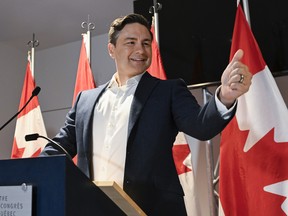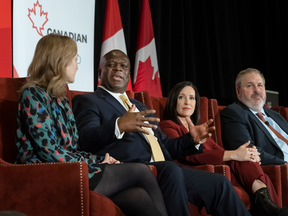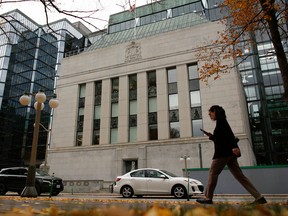Common sense implies there are simple fixes to big problems, and there are not
Article content
While Pierre Poilievre probably wasn’t giving them much thought this weekend during his Conservative Party’s policy convention in Quebec City, G20 leaders were also meeting 11,000 kilometres away in New Delhi to deliberate on some of the world’s biggest challenges.
Their assessment was sobering. The leaders, who included Prime Minister Justin Trudeau, put out a declaration warning that “cascading crises” were posing major challenges to long-term growth, with elevated levels of uncertainty and risks tilted to the downside.
Advertisement 2
Article content
Article content
The mood in Quebec City, by comparison, was more assured and optimistic — not just because Conservatives are currently holding a large lead in the polls, but by design.
Like all challengers making the case for a change in government, Poilievre is raising expectations at a time when the current zeitgeist in economic policy making is to lower them.
In his one-hour long keynote speech on Friday, Poilievre delivered a treatise on how Canada is “broken” and Canadians are hurting, and promised to bring back better days with “common-sense” solutions to shrink government, lower taxes and reduce crime. It was all very familiar terrain for Poilievre, including the built-in rallying cry for change centred around his “Bring it Home” slogan. It’s Poilievre’s version of hope and change, and sunny ways.
What there is little of in Conservative messaging, however, is the notion that Canada’s government — like others in the G20 — is facing an incredibly complex landscape in the next few years that will not produce easy wins. Common sense implies there are simple fixes to big problems, and there are not.
Article content
Advertisement 3
Article content
We have entered an era of supply-constrained economies and policy trade-offs — higher interest rates, more inflation, aging demographics, slower long-term growth, less globalization and more geopolitical conflict.
Promises to ease the cost-of-living crisis, make housing more affordable, drive incomes higher, spend more on defence, and stoke energy development without undermining climate transition efforts are easier said than done.
It may turn out that many of Poilievre’s ideas and proposals will indeed be effective, and produce positive change. But the big challenges run deep.
It’s not apparent, for example, how Canada can resolve the housing affordability crisis without a major correction in home prices — even if Poilievre were to somehow manage to fuel new construction or accelerate growth in real wages. The gap in Canada between home values and incomes is just too great.
One short-term solution — outside of a major recession — would be a sudden curtailment of international migration flows, a big can of worms.
Even if Poilievre did have the capacity to somehow engineer a drop in home prices to help first-time home buyers, it’s not clear he would. It would prove extremely unpopular with the vast majority of Canadian homeowners sitting on all that equity wealth. Housing has become a big mess of a file.
Advertisement 4
Article content
Meanwhile, calls for smaller government, balanced budgets and lower taxes are crowd favourites but the longer-term structural forces in the economy — from aging to industrial policy and energy transition — suggest bigger government may be here to stay. Poilievre has made it clear, for example, that his climate plan will rely on technology and not taxes to drive down carbon emission. But that’s going to be very expensive, as the Liberals are already finding out.
How will Conservatives finance their promise to increase defence spending? Will the party forego handing out tax cuts in order to avoid stoking inflation?
Where are the Conservatives on industrial policy and supply-chain resiliency — new trends in policy making that put the state at the centre of economic development?
Macroeconomic policy, in particular, could prove to be a big headache.
What if inflation fails to come down fully to two per cent — let’s say it gets stuck at three per cent or higher due to all these emerging supply hurdles. Would the Conservatives be willing to tolerate a higher inflation rate, or would they support further activity-killing increases in interest rates to squeeze out all inflationary pressures?
Advertisement 5
Article content
It’s a trade-off that will have disparate impacts. Young and indebted Canadians would welcome a bit of inflation in exchange for lower interest rates. Older Canadians are impacted more negatively by inflation and are more likely to gain from higher interest rates.
Straddling the generational fault line, in fact, may turn out to be one of the toughest tasks any future government will face in coming years.
There’s a lot of policy messiness on the horizon that Poilievre is unlikely to dwell on — at least publicly — as his party plots its path toward the next election.
-

Will Trudeau government breach David Dodge Rule?
-

After 3 years at finance, Freeland’s second act is still unclear
-

Why Bank of Canada is likely to overdo it in fight against inflation
It’s not that Conservatives wouldn’t love to talk about the tough choices to be made, and how there are no more free lunches to be had and the importance of living within your means. This is the stuff they’ve traditionally been made of.
It’s just that one of the advantages of not being an incumbent is that you don’t have a record to defend, leaving you free to focus on hope-and-change messaging while the incumbent answers for the policy choices they have made in government. And as the G20 reminded us this weekend, there are no easy answers out there.
Theo Argitis is managing director at Compass Rose Group
Article content
Poilievre sells common sense but economy requires complex trade-offs
2023-09-11 14:44:28






Comments
Postmedia is committed to maintaining a lively but civil forum for discussion and encourage all readers to share their views on our articles. Comments may take up to an hour for moderation before appearing on the site. We ask you to keep your comments relevant and respectful. We have enabled email notifications—you will now receive an email if you receive a reply to your comment, there is an update to a comment thread you follow or if a user you follow comments. Visit our Community Guidelines for more information and details on how to adjust your email settings.
Join the Conversation